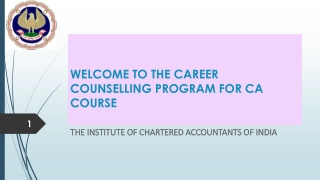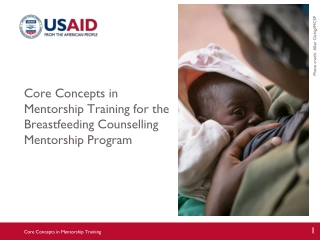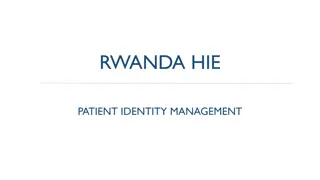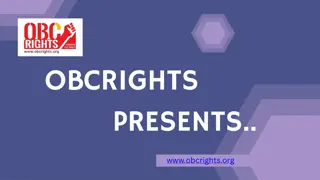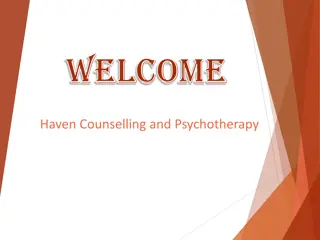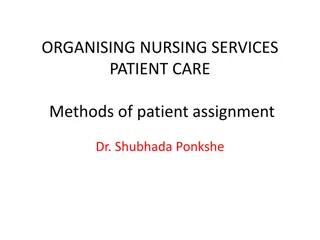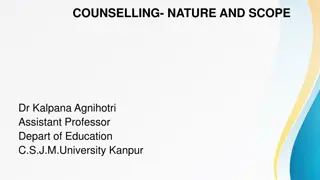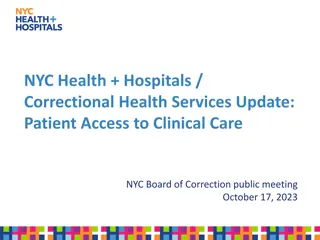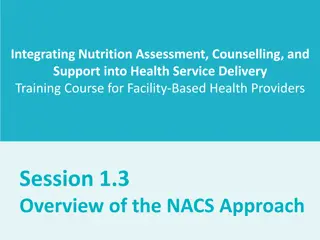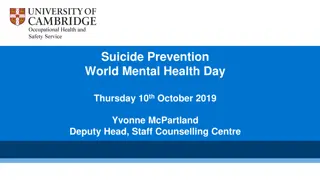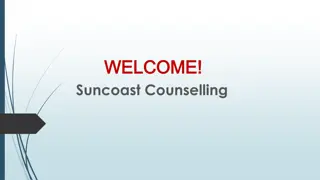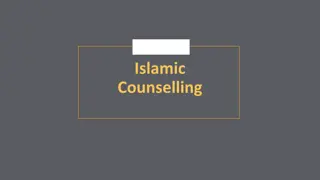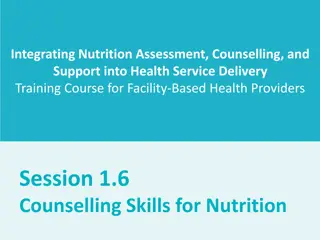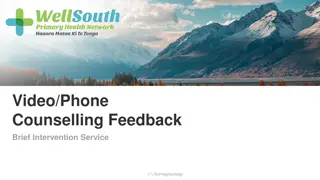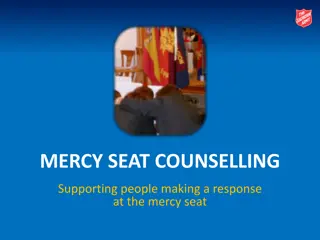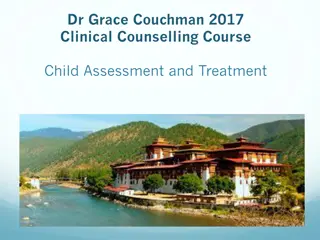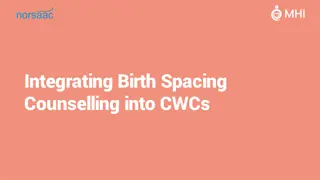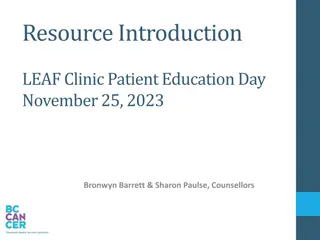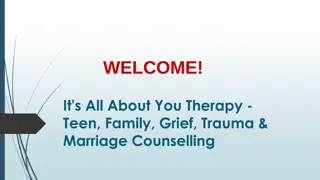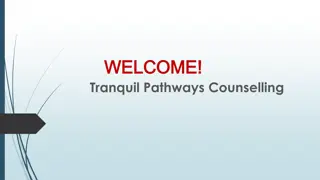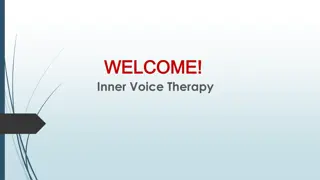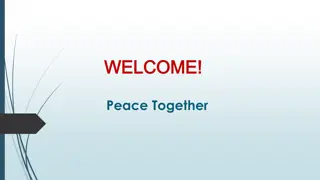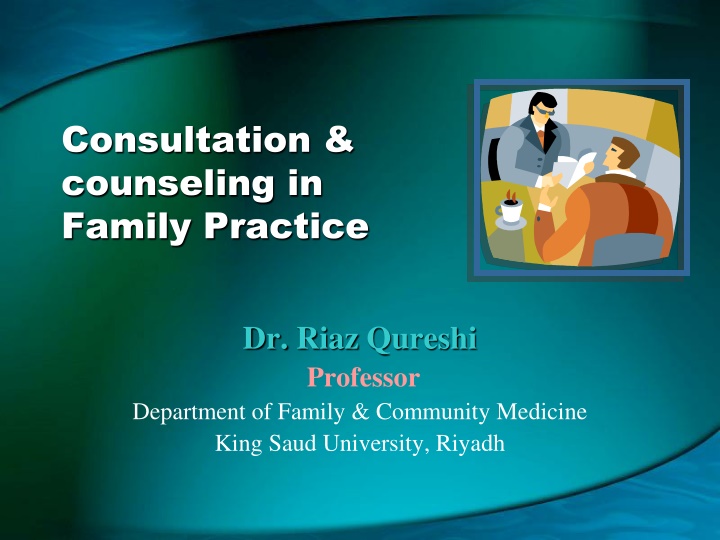
Consultation and Counseling in Family Practice
Explore the concepts of consultation and counseling in family practice, and why these skills are essential for physicians. Learn about the theories, stages of counseling, and possible barriers that may arise. Discover the importance of specialized counseling in helping patients develop self-knowledge, emotional acceptance, and personal growth.
Download Presentation

Please find below an Image/Link to download the presentation.
The content on the website is provided AS IS for your information and personal use only. It may not be sold, licensed, or shared on other websites without obtaining consent from the author. If you encounter any issues during the download, it is possible that the publisher has removed the file from their server.
You are allowed to download the files provided on this website for personal or commercial use, subject to the condition that they are used lawfully. All files are the property of their respective owners.
The content on the website is provided AS IS for your information and personal use only. It may not be sold, licensed, or shared on other websites without obtaining consent from the author.
E N D
Presentation Transcript
Consultation & counseling in Family Practice Dr. Riaz Qureshi Professor Department of Family & Community Medicine King Saud University, Riyadh
Objectives : To understand the concepts of consultation and counseling To learn why are consultation & counseling skills important ? To learn the theories and stages of counseling What are the possible barriers ?
http://youtu.be/NH8sEpc_ A9I https://www.youtube.com/watch?v =xrHgOoNBiWk
Why Consultation/counseling Skills? Family Physicians may need to be bearers of the worst and best imaginable news They have to arrange complex and often uncertain information into something understandable They have to respond to differing needs of a hugely diverse range of patients and their families And they have to do much of this when they are busy and under pressure
Consultation Consultation is the entire process of interaction between a patient and a doctor in the privacy of a room It includes from initial welcome to history taking, examination, investigation, assessment and management including advice, follow up and referral (if needed)
Counseling Counseling in Family Practice is very often a part of the management in the consultation process (helping the patient to help himself) It relates basically to an interaction between a doctor and a patient with the aim of helping the patient to understand the true nature of the problem so that he can play an active role in solving or managing it
What is specialized Counseling? It is the skilled and principled use of relationship to help the patient develop self- knowledge, emotional acceptance and growth including personal resources Counselors who offer warmth, genuineness and empathy are more effective
Theories of Counseling Directive: Active or directive counselors tend to interpret, lead and direct their clients Non-directive: Non-directive, or reflective counselors tend to elicit and reflect, guide and support their clients
Aims of counseling: To help people accept and come to terms with their difficulties and identify ways of coping more effectively and resourcefully The counselor listens and asks questions until both counselor and client understand the way the client sees things The counselor enables the client to clarify thoughts and feelings for better understanding of the problem
Stages of Counseling Exploration: Enabling the patient to explore the problem himself and then focus on specific concerns New understanding: To see both, themselves and their situation in new perspectives and how to cope more effectively Goal setting Action: Possible ways to act ; costs/consequences, planning, implementation and evaluation ; creative thinking, problem solving and decision making
Stages of counseling - example Exploration: Patient- I want to kill myself Doctor : Why do you want to kill yourself? New understanding: Patient - My boy friend left me for a more muscular man Doctor : Have you considered all other possible options ? Goal setting: Patient I shall become more muscular Action: Patient I Shall join a Gym
Consultation & Counseling Skills If a joint understanding of the problem & its management plan (the patient understands, feels comfortable with, and is prepared to adhere to) is not made: the patient is not likely to follow the advice and all our efforts in assessment and diagnosis are wasted (Silverman et al. 1998)
Evidence Base: Individual Consultation: For the doctor it is one of many routine encounters, something to be got through as fast as possible given the number of other patients waiting to be seen. But for the patient, it may be the most important and stressful aspect of his/ her week .or the last six months, as they wait anxiously for the appointment and their chance to see the doctor
The Evidence Base contd 54% of patient s problems & concerns not elicited (Stewart et al, 1979) Doctors frequently interrupted their patients soon after their opening statement (mean time 18 seconds) so patients subsequently failed to disclose significant problems (Beckman and Frankel, 1984) Failing to discover the patient s feelings and concerns led to dysfunctional consultations and counselling (Byrne and Long, 1976)
Deficiencies in Communication &Counseling Doctors may not obtain enough information about patients perspective Provide information in inflexible way Pay little attention in checking how well patients have understood Less than half of patients psychological morbidity is recognized
Laughter is the best medicine Wife : I lost my keys again ! Husband : It s in your jeans (not genes) Wife : Don t drag my family into this ---- Moral : Listen properly before reacting
Blocking Behavior of Doctors Offering advice and reassurance before the main problems have been identified Explaining away distress as normal Attending to physical aspects only Switching the topic Jollying patients along
Reasons for patients not disclosing problems Belief that nothing can be done Reluctance to burden the Doctor Desire not to appear pathetic or ungrateful Concern that it is not legitimate to mention them Doctors blocking behavior Worry to congfrm that their fears confirmed Lack of confidentiality and trust
What is a failed consultation/ Counseling? No rapport Using medical jargon Not exploring the patients agenda Not eliciting the actual problem No contingency plan/ no safety netting No summarization Failing to clarify Not exploring in socio-cultural & economic context
Problems & Limitations in Communication & Counseling: Shortage of time Language barrier low literacy Firm misconceptions and myths Lack of Dr awareness Pts not ready to take responsibility for own illness Socio-cultural, economic barriers Fatalistic attitude (It s God s will)
Barriers to Communication/Counseling in Clinical Practice Personal Barriers Lack of training: undergraduate/postgraduate Undervaluing importance of communication Focus only on treating diseases Personal Limitations Organizational Barriers Lack of time Pressure of work Interruptions
Why Consultation & Counseling Skills? When doctors use consultation & counseling skills effectively: Patients problems identified more accurately Patients more satisfied with their care Patients more likely to comply with treatment Patients distress & vulnerability to anxiety & depression are lessened
Why Consultation / Counseling Skills? When doctors use consultation skills effectively Doctors and patients wellbeing is improved Few clinical errors are made Patients are less likely to complain Reduced likelihood of doctors being sued Good communication & counseling is good for doctors good for patients and good for the health service
Moving from open to closed questioning The Open-to-Closed Cone Open ended questions to explore the field Mid-way questions directional statements Closed questions used following information gathering to focus in
CONSULTATION & COUNSELING Longer duration of consultations and counseling result in lesser prescription of drugs and more patient satisfaction Reference
CONCULSION The traditional medical model for consultation and counseling does not recognize the complexity and diversity of the consultation & counseling in family practice. Consultation & counseling models are many. Each views the process from a slightly different perspective. The consultation & counseling model should match the individual needs of the patients and doctors.

